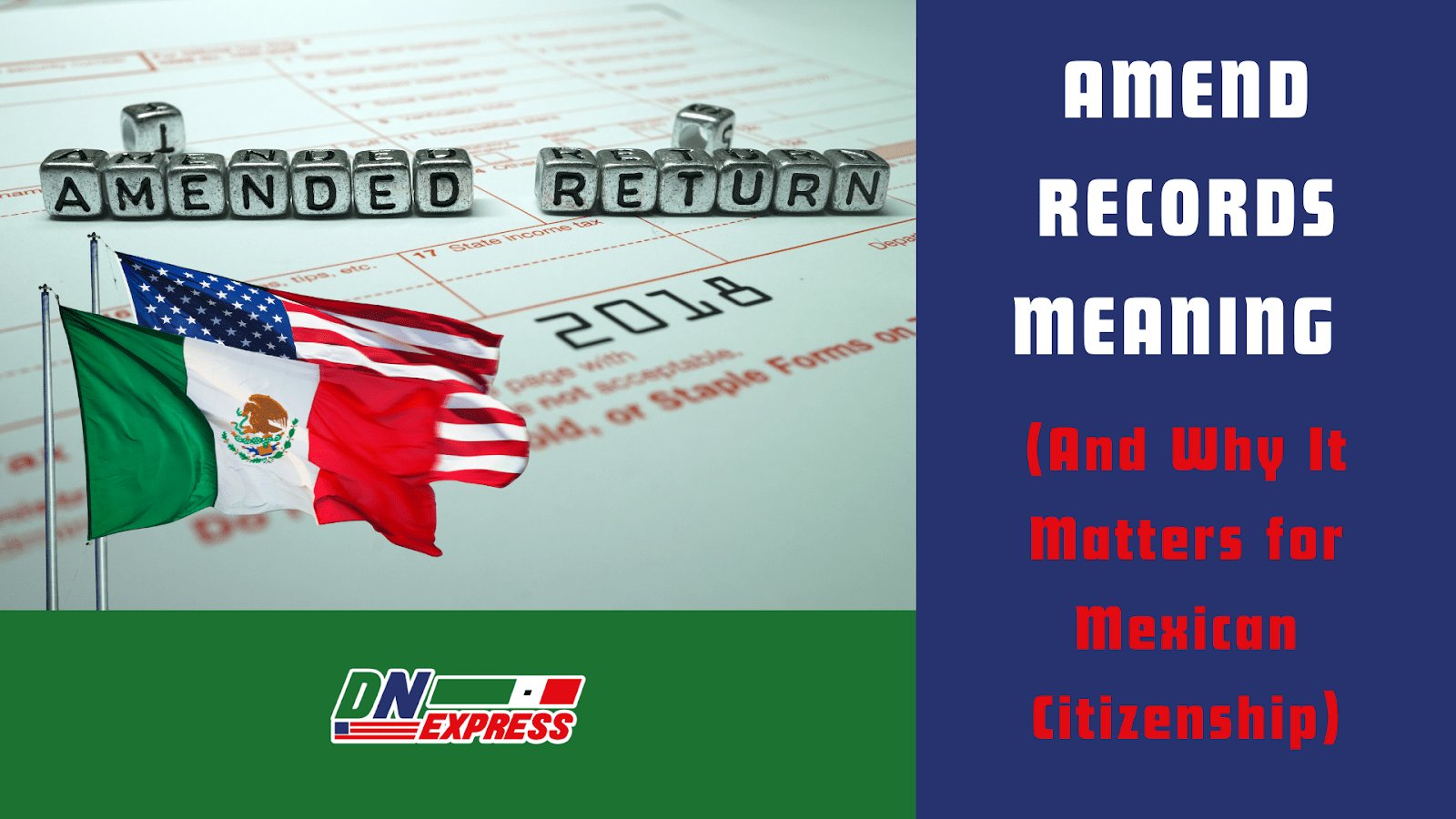
To amend records means to legally correct or update errors in official documents, like birth certificates, court files, or government reports, without erasing the original.
For U.S.-born Mexicans, this can be critical for reclaiming nationality and securing dual citizenship.
But here’s where it gets tricky: amending records isn’t the same for everyone. Whether you’re correcting a parent’s name, fixing a birth date, or aligning U.S. and Mexican documents, the process, and stakes, change depending on your situation.
We help clients navigate these challenges daily.
From rejected consulate applications to “impossible” document errors, our licensed attorneys make it possible to amend or resolve issues, often without ever stepping foot in a consulate.
Want the full breakdown? Keep reading. You’ll learn what “amend records” really means, why it matters for your citizenship journey, and how to fix these issues the smart way.
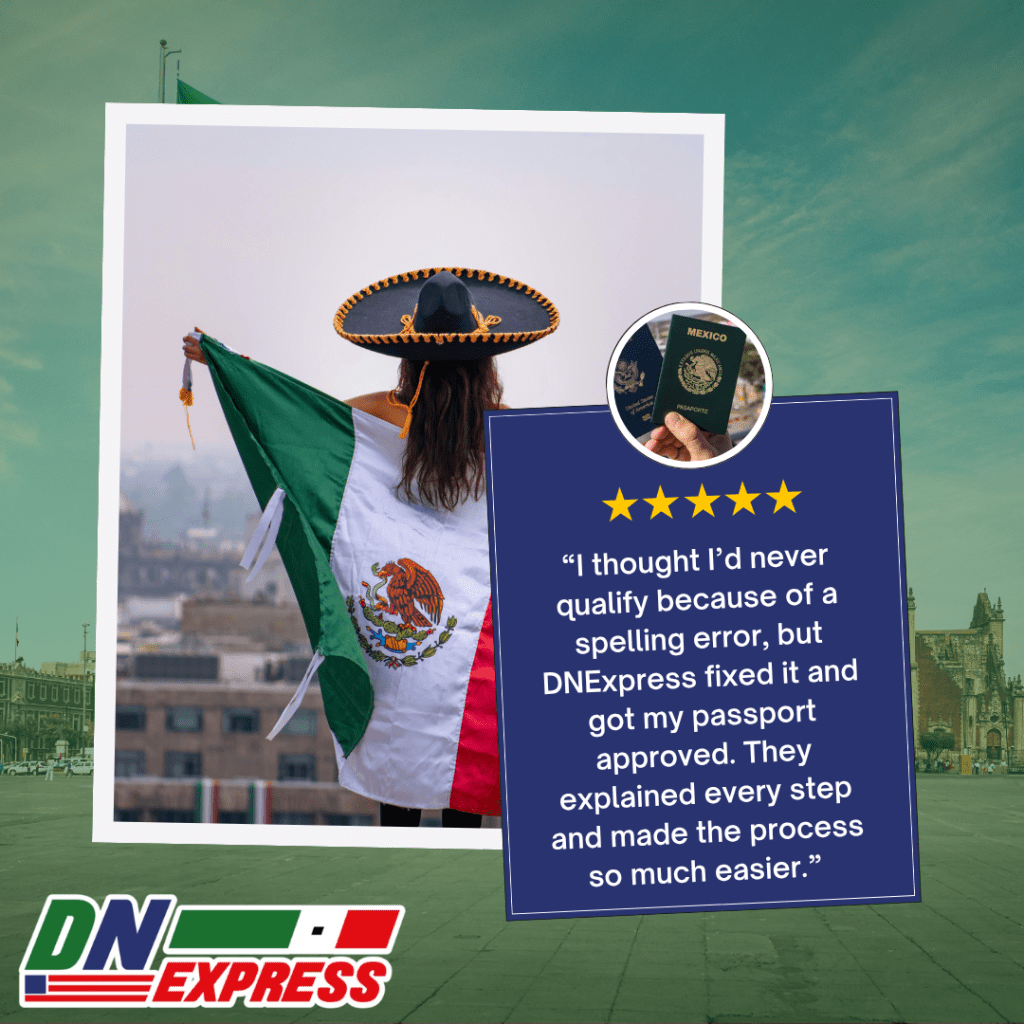
What Does “Amend Records” Mean?
A Simple Definition of Amending Records
To amend records means to correct, add, or clarify details in official documents while keeping the original information visible. It’s a legal update, not a replacement, that ensures records are accurate for identity, legal, or administrative purposes.
Importantly, an amendment doesn’t erase history. Instead, it appends the correction so anyone reviewing the document sees both the original entry and the change.
Example: If a parent’s name was misspelled on your birth certificate, an amendment legally corrects it to match other records, vital when applying for doble ciudadanía or a passport.
Why It Matters for U.S.-Born Mexicans Seeking Citizenship
For U.S.-born children of Mexican parents, document errors can create roadblocks when applying for Mexican nationality.
Mexican authorities frequently reject applications if parent names or dates don’t match between U.S. and Mexican documents.
This is where amending records becomes crucial. Correcting these inconsistencies can unlock eligibility and prevent years of delays or denials.
Frequent worry: Does an amended birth certificate mean I was adopted?
Answer: No. “Amended” simply indicates a legal update to fix or clarify a record, not a change in parentage or legal status.
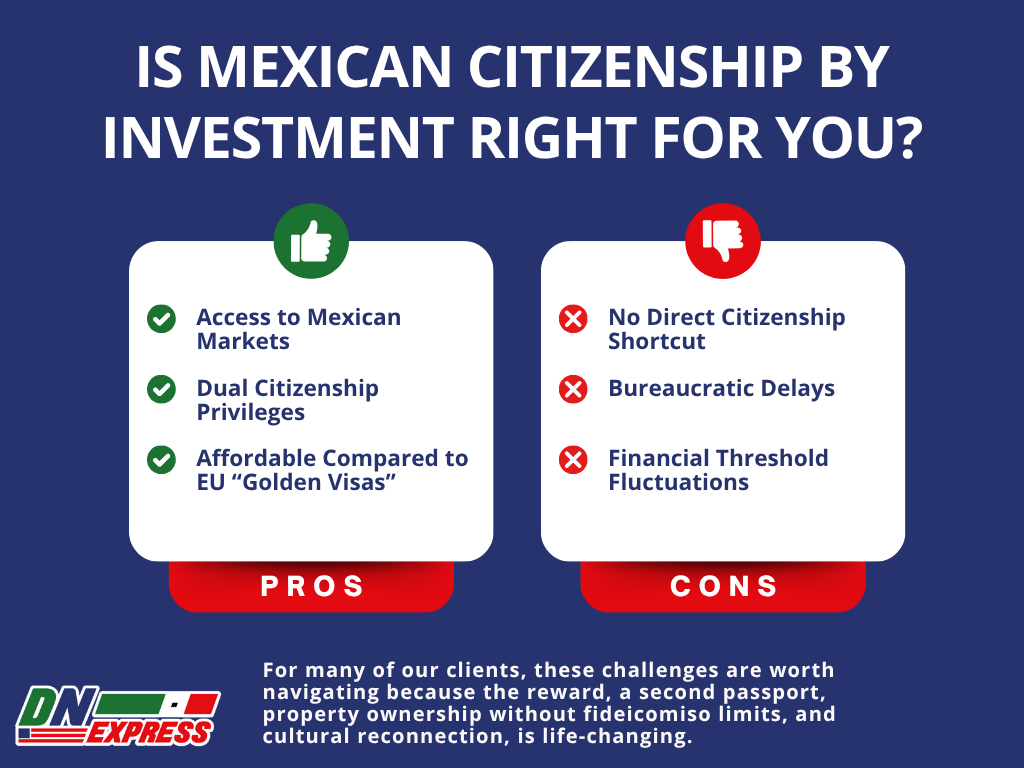
How Amendments Differ by Your Situation
U.S.-Born Children of Mexican Parents
If you were born in the U.S. to one or both Mexican parents, your birth certificate may only list a single last name. But in Mexico, it’s standard to use both parents’ surnames.
This mismatch often causes citizenship applications to stall.
Amending your U.S. birth certificate to include both parents’ last names can help align your documents with Mexican naming conventions, making your nationality claim smoother and avoiding consular rejections.
Adults With Mexican Heritage
Adults reclaiming their Mexican nationality after years, or decades, often encounter outdated or inaccurate records.
Spelling mistakes in parent names, missing middle names, or incorrect birth dates are typical in older documents.
Amendments are vital for cleaning up these errors and formalizing your legal connection to Mexico. Without these updates, even small discrepancies can block your application.
Families Wanting Dual Citizenship for Their Kids
Parents registering their U.S.-born children for Mexican citizenship frequently discover U.S. birth certificates lack details Mexican authorities require.
Missing a second surname or minor typos can trigger rejection.
Amending these records ensures your child’s documents meet Mexican legal standards and protects their right to dual nationality.
Individuals Correcting Documents for Eligibility
For some, the path to doble ciudadanía is blocked by deeper issues: birth dates, parent names, or even gender markers that don’t align between countries.
Example: One client discovered their middle name on their U.S. birth certificate appeared as a first name in Mexican documents.
Amending their record was the only way to resolve this and qualify for citizenship.
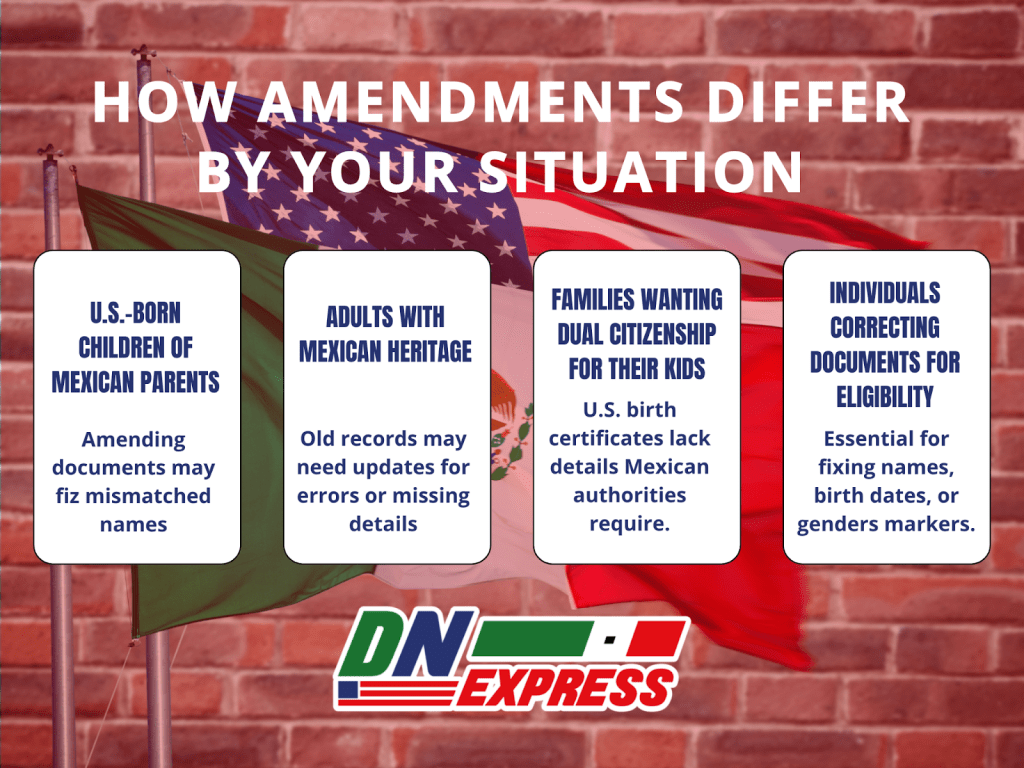
Mexican-Americans Rejected by Consulates
Many Mexican-Americans have been turned away by consulates because of mismatches between U.S. and Mexican records.
In these cases, legal amendments often provide the key to reopening their case.
With professional help, these document corrections can reverse denials and move your citizenship process forward.
Example of Amending a Record
Consider this scenario:
A client’s U.S. birth certificate listed her name as “Maria Lopez,” while her Mexican parent’s documents showed “Maria Lopez Garcia.”
This mismatch caused rejection at the consulate.
By amending her U.S. record to include both surnames, she successfully qualified for Mexican citizenship.
Why Work With Doble Nacionalidad Express?
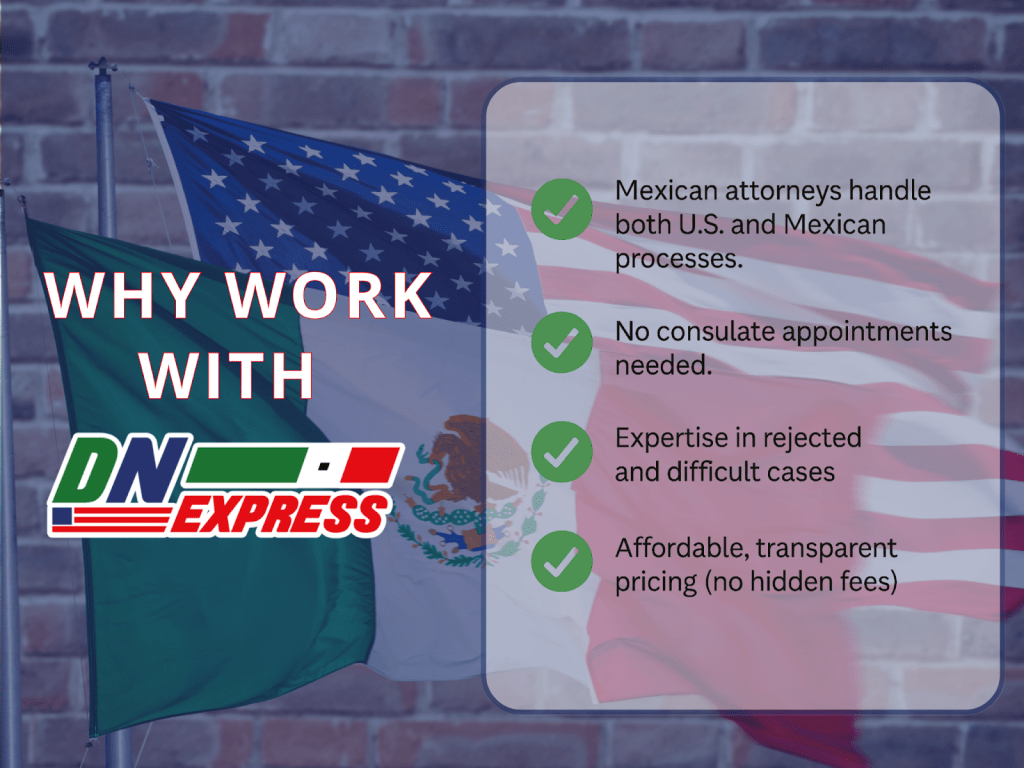
The Risks of DIY Amendments
Amending official records might seem straightforward, but one misstep can create lasting consequences:
- Misfiled corrections can result in permanent rejections from Mexican authorities.
- Navigating complex U.S.-Mexico legal differences without guidance often frustrates families and wastes valuable time.
- Consulates rarely provide clear support for fixing document errors, leaving applicants stuck in a cycle of delays and denials.
Attempting it alone can feel like hitting a wall, especially when dealing with multiple jurisdictions and sensitive timelines.
DNExpress Advantages
We make it simple and stress-free:
- Licensed Mexican attorneys manage both U.S. and Mexican processes seamlessly.
- No consulate appointments required, we handle everything remotely.
- Experts in rejected and difficult cases, turning “no” into “yes” for thousands of clients.
- Affordable, transparent pricing with no hidden fees or surprise charges.
- Full privacy and document security, your sensitive records stay safe with our in-house team.
With offices on both sides of the border and agents in every Mexican state, we’re built to resolve even the toughest document challenges.
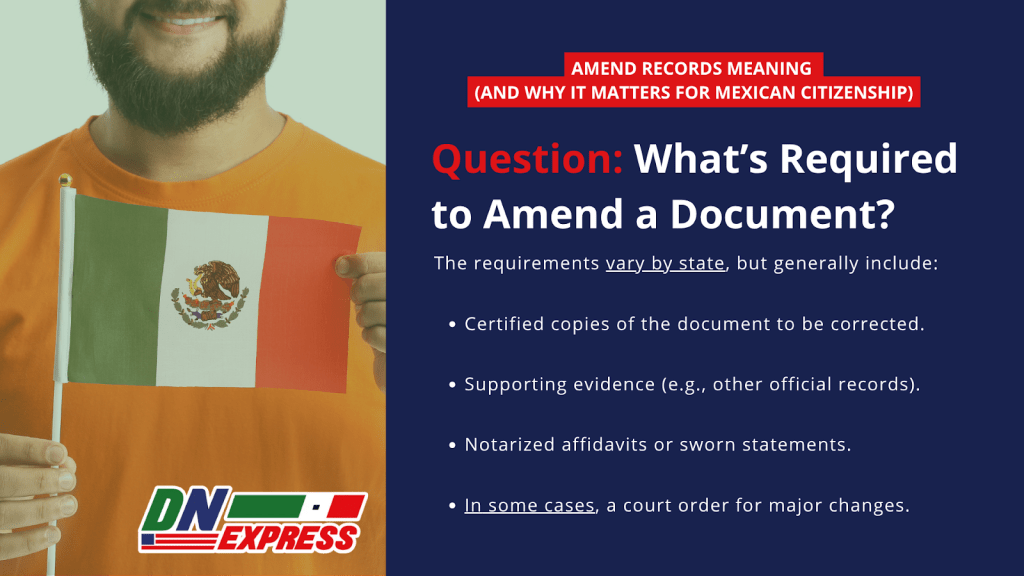
Client Success Stories
“I thought I’d never qualify because of a spelling error, but DNExpress fixed it and got my passport approved. They explained every step and made the process so much easier.”
Every success story we create is proof that with the right help, reclaiming your Mexican identity is not only possible, it’s closer than you think.
Ready to Reclaim Your Roots?
We specialize in correcting records and securing Mexican citizenship, even if you’ve been rejected before.
Best of all, we handle everything without requiring consulate visits.
Schedule a free consultation o Message Us on WhatsApp today to take the first step toward your dual nationality.
Closest Meanings to Amend (Synonyms & Contexts)
If you’re wondering what “amend” really means, here are the closest synonyms and how they fit in legal and official contexts:
- Correct – Fix errors or inaccuracies in a document.
- Update – Add new or revised information to keep records current.
- Adjust – Make minor changes to align with legal or administrative requirements.
- Modify – Change certain parts of a document without rewriting the whole thing.
- Clarify – Provide additional details or corrections to avoid confusion.
Each of these reflects how amendments work in practice, they enhance accuracy while preserving the original record’s integrity.
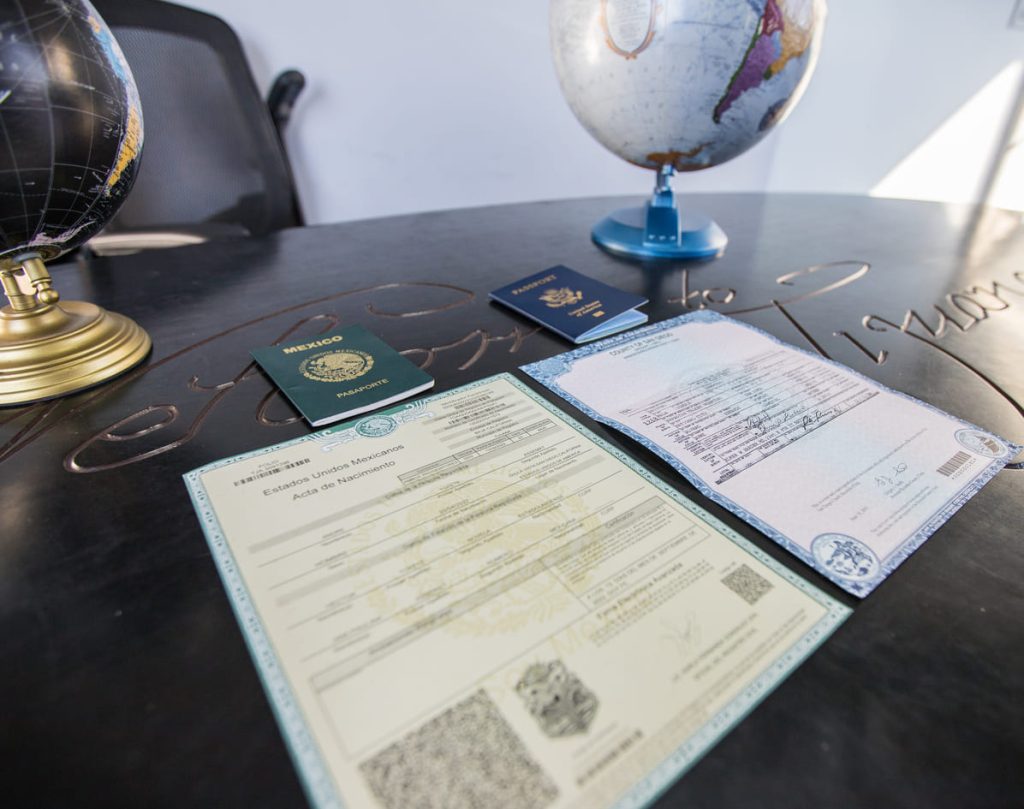
Preguntas frecuentes “Amend Records” Answered
What are Amend Records?
Amend records are legally corrected versions of official documents that preserve both the original information and the updated details.
Instead of replacing the old data, amendments create a transparent record of changes, ensuring accuracy without erasing history.
Does “Amended” Mean Edited or Removed?
No.
An amended document is not edited or erased. It simply reflects a legal correction or update. The original information remains visible for reference, along with the amendment details.
This is a frequent fear among clients who ask if “amended” means their birth certificate was altered in a way that affects their identity. Rest assured, it doesn’t.
What’s Required to Amend a Document?
The requirements vary by state, but generally include:
- Certified copies of the document to be corrected.
- Supporting evidence (e.g., other official records).
- Notarized affidavits or sworn statements.
- In some cases, a court order for major changes.
Frequent worry: “Do I need my deceased parent’s ID to amend?”
Answer: Often no. With the right legal assistance, alternative documents can usually satisfy the requirements.
What Happens If I Don’t Amend?
Failing to correct errors in your records can create major obstacles:
- Mexican nationality applications may be rejected.
- Future U.S. passport, Social Security, or immigration processes could stall.
- Even property inheritance in Mexico can be affected.
It’s far better to fix these issues proactively than risk years of delays later.
Does Amending Take Long?
In the U.S., amendments typically take 6 weeks to several months depending on the state and complexity.
We help clients bypass these delays when possible.
Our team often resolves document issues directly in Mexico, avoiding months of waiting and consulate bottlenecks.
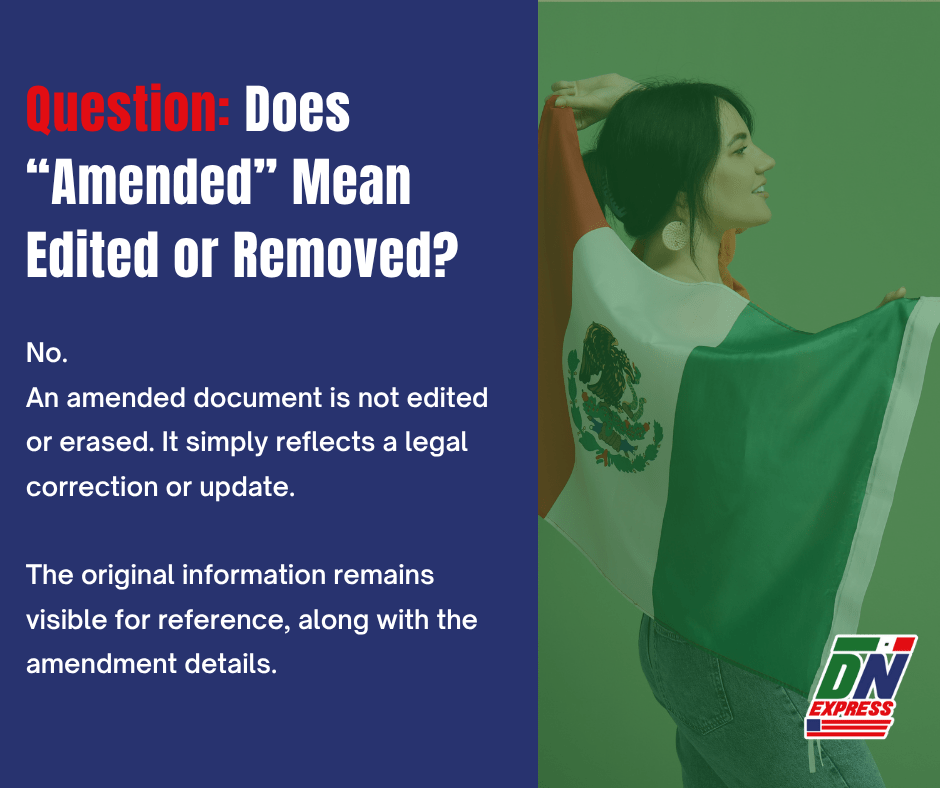
Reserve una Consulta Gratuita now, or Message Us on WhatsApp, it will be a pleasure to help you on the road to your dual nationality.



